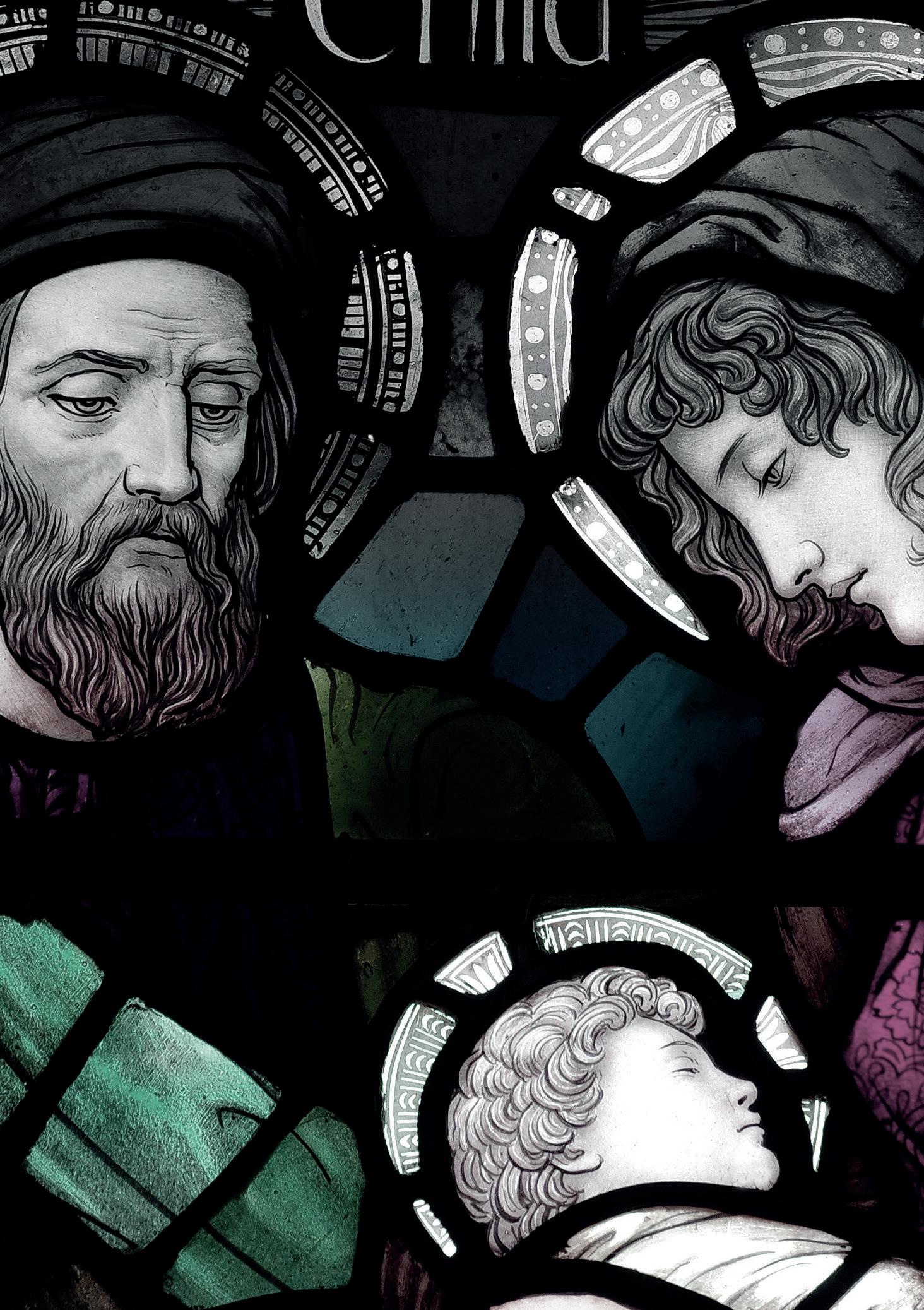

L'Enfance du Christ
27-28 November 2025


L'Enfance du Christ
Thursday 27 November, 7.30pm Usher Hall, Edinburgh
Friday 28 November, 7.30pm City Halls, Glasgow
BERLIOZ L’Enfance du Christ
Interval of 20 minutes after Part 1
Maxim Emelyanychev conductor
Paula Murrihy Mary
Andrew Staples Narrator, Centurion
Roderick Williams Joseph, Polydorus
Callum Thorpe Herod, Ishmaelite Father
SCO Chorus
Gregory Batsleer chorus director

SCO, Maxim and SCO Chorus
4 Royal Terrace, Edinburgh EH7 5AB
+44 (0)131 557 6800 | info@sco.org.uk | sco.org.uk
The Scottish Chamber Orchestra is a charity registered in Scotland No. SC015039. Company registration No. SC075079.
Christopher Bowen
THANK YOU
Principal Conductor's Circle
Our Principal Conductor’s Circle are a special part of our musical family. Their commitment and generosity benefit us all – musicians, audiences and creative learning participants alike.
Annual Fund
James and Patricia Cook
Visiting Artists Fund
Harry and Carol Nimmo
Anne and Matthew Richards
International Touring Fund
Gavin and Kate Gemmell
Creative Learning Fund
Sabine and Brian Thomson
CHAIR SPONSORS
Conductor Emeritus Joseph Swensen
Donald and Louise MacDonald
Chorus Director Gregory Batsleer
Anne McFarlane
Principal Second Violin
Marcus Barcham Stevens
Jo and Alison Elliot
Second Violin Rachel Smith
J Douglas Home
Principal Viola Max Mandel
Ken Barker and Martha Vail Barker
Viola Brian Schiele
Christine Lessels
Viola Steve King
Sir Ewan and Lady Brown
Principal Cello Philip Higham
The Thomas Family
Sub-Principal Cello Su-a Lee
Ronald and Stella Bowie
Cello Donald Gillan
Professor Sue Lightman
American Development Fund
Erik Lars Hansen and Vanessa C L Chang
Productions Fund
Anne, Tom and Natalie Usher
Bill and Celia Carman
Scottish Touring Fund
Eriadne and George Mackintosh
Claire and Anthony Tait
Cello Eric de Wit
Jasmine Macquaker Charitable Fund
Principal Flute André Cebrián
Claire and Mark Urquhart
Principal Oboe
The Hedley Gordon Wright Charitable Trust
Sub-Principal Oboe Katherine Bryer
Ulrike and Mark Wilson
Principal Clarinet Maximiliano Martín
Stuart and Alison Paul
Principal Bassoon Cerys Ambrose-Evans
Claire and Anthony Tait
Sub-Principal Bassoon Alison Green
George Rubienski
Principal Horn Kenneth Henderson
Caroline Hahn and Richard Neville-Towle
Principal Timpani Louise Lewis Goodwin
Geoff and Mary Ball
Funding Partners





SCO Donors
Diamond
The Cockaigne Fund
Malcolm and Avril Gourlay
John and Jane Griffiths
James and Felicity Ivory
George Ritchie
Tom and Natalie Usher
Platinum
E.C. Benton
Michael and Simone Bird
Silvia and Andrew Brown
David Caldwell in memory of Ann
Dr Peter Williamson and Ms Margaret Duffy
Judith and David Halkerston
David and Elizabeth Hudson
Helen B Jackson
Dr and Mrs Peter Jackson
Dr Daniel Lamont
Graham and Elma Leisk
Professor and Mrs Ludlam
Chris and Gill Masters
Duncan and Una McGhie
Anne-Marie McQueen
James F Muirhead
Robin and Catherine Parbrook
Patrick and Susan Prenter
Mr and Mrs J Reid
Martin and Mairi Ritchie
Hilary E Ross
Elaine Ross
Sir Muir and Lady Russell
Jill and Brian Sandford
Michael and Elizabeth Sudlow
Robert and Elizabeth Turcan
Alan and Sue Warner
Anny and Bobby White
Robert Mackay and Philip Whitley
Finlay and Lynn Williamson
Ruth Woodburn
Gold
Peter Armit
Adam Gaines and Joanna Baker
John and Maggie Bolton
Elizabeth Brittin
Kate Calder
James Wastle and Glenn Craig
Jo and Christine Danbolt
James and Caroline Denison-Pender
Andrew and Kirsty Desson
David and Sheila Ferrier
Chris and Claire Fletcher
James Friend
Iain Gow
Margaret Green
Christopher and Kathleen Haddow
Catherine Johnstone
Julie and Julian Keanie
Gordon Kirk
Janey and Barrie Lambie
Mike and Karen Mair
Roy and Svend McEwan-Brown
John and Liz Murphy
Tom Pate
Maggie Peatfield
Sarah and Spiro Phanos
Charles Platt and Jennifer Bidwell
Alison and Stephen Rawles
Andrew Robinson
Olivia Robinson
Anne McAlister and Philip Sawyer
Irene Smith
Dr Jonathan Smithers
Ian S Swanson
Ian and Janet Szymanski
John-Paul and Joanna Temperley
Douglas and Sandra Tweddl
Bill Welsh
Catherine Wilson
Neil and Philippa Woodcock
Silver
Roy Alexander
Fiona and Neil Ballantyne
The Batsleer Family
Jack Bogle
Jane Borland
Alan Borthwick
Dinah Bourne
Michael and Jane Boyle
Mary Brady
John Brownlie
Laura Buist
Robert Burns
Sheila Colvin
Lorn and Camilla Cowie
Adam and Lesley Cumming
Dr Wilma Dickson
Seona Reid and Cordelia Ditton
Sylvia Dow
Colin Duncan in memory of Norma Moore
Raymond Ellis
Dr and Mrs Alan Falconer
Sheila Ferguson
Dr William Irvine Fortescue
Dr David Grant
Anne Grindley
Andrew Hadden
J Martin Haldane
Ronnie and Ann Hanna
Roderick Hart
Norman Hazelton
Ron and Evelynne Hill
Philip Holman
Clephane Hume
Tim and Anna Ingold
David and Pamela Jenkins
Margaret Mortimer and Ken Jobling
Ross D. Johnstone
Professor Christopher and Mrs Alison Kelnar
Dr Ian Laing
Geoff Lewis
Dorothy A Lunt
Vincent Macaulay
James McClure in memory of Robert Duncan
Ben McCorkell
Lucy McCorkell
Gavin McCrone
Michael McGarvie
Brian Miller
Alistair Montgomerie
Andrew Murchison
Pamela Andrews and Alan Norton
Gilly Ogilvy-Wedderburn
John Peutherer in memory of Audrey Peutherer
James S Potter
Timothy Barnes and Janet Sidaway
Catherine Steel
John and Angela Swales
Takashi and Mikako Taji
C S Weir
Susannah Johnston and Jamie Weir
David and Lucy Wren
We are indebted to everyone acknowledged here who gives philanthropic gifts to the SCO of £300 or greater each year, as well as those who prefer to remain anonymous.
We are also incredibly thankful to the many individuals not listed who are kind enough to support the Orchestra financially on a regular or ad hoc basis. Every single donation makes a difference.
Become a regular donor, from as little as £5 a month, by contacting Hannah Wilkinson on 0131 478 8364 or hannah.wilkinson@sco.org.uk.
“…an orchestral sound that seemed to gleam from within.”
THE SCOTSMAN
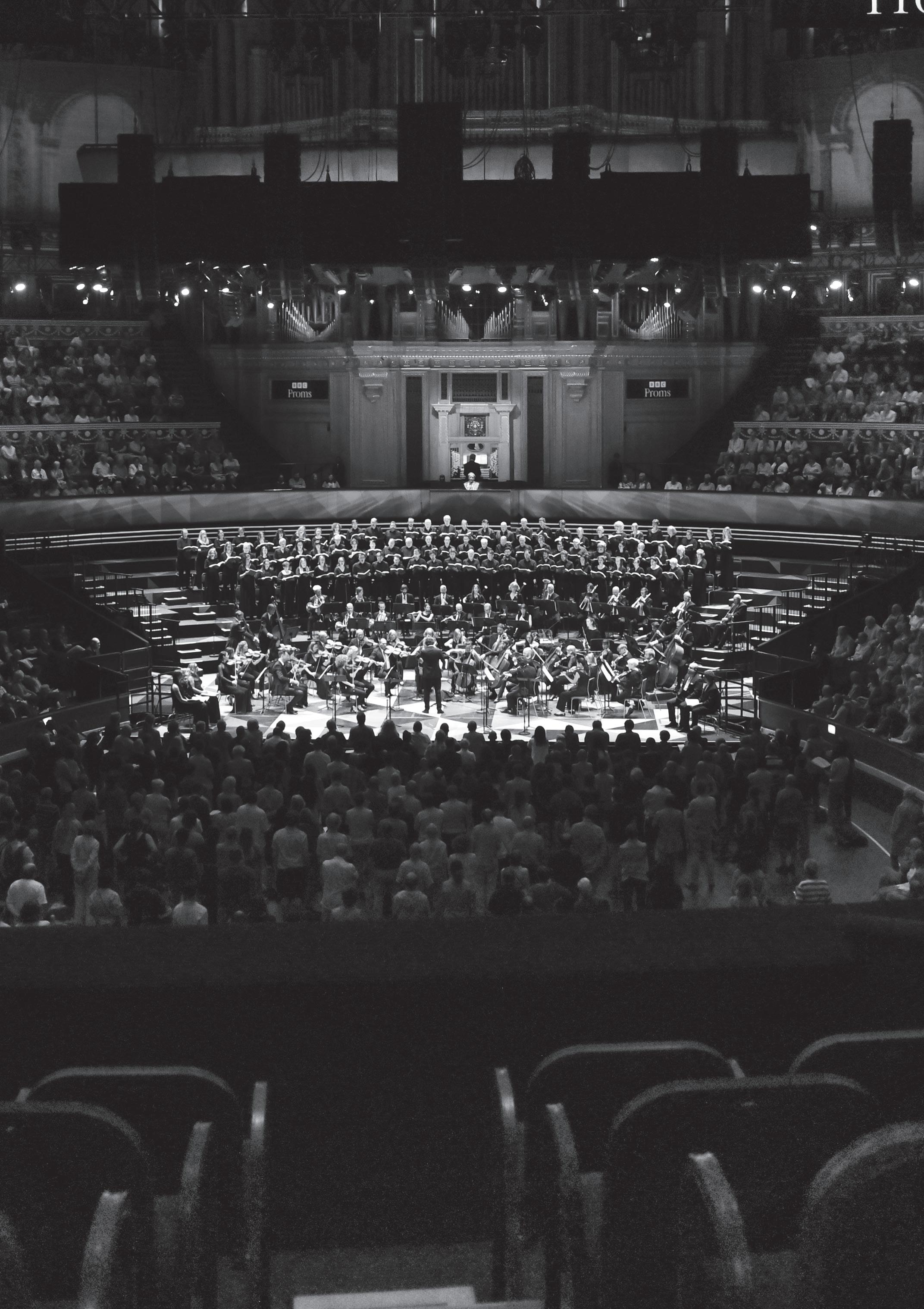
HM The King Patron
Donald MacDonald CBE
Life President
Joanna Baker CBE Chair
Gavin Reid LVO
Chief Executive
Maxim Emelyanychev
Principal Conductor
Andrew Manze
Principal Guest Conductor
Joseph Swensen
Conductor Emeritus
Gregory Batsleer
Chorus Director
Jay Capperauld
Associate Composer
© Chris Christodoulou
Our Musicians
Your Orchestra Tonight
Information correct at the time of going to print
First Violin
Stephanie Gonley
Afonso Fesch
Hatty Haynes
Fiona Alexander
Aisling O’Dea
Amira Bedrush-McDonald
Sarah Bevan Baker
Wen Wang
Second Violin
Charlotte Saluste-Bridoux
Gordon Bragg
Michelle Dierx
Rachel Smith
Rachel Spencer
Kristin Deeken
Amy Cardigan
Jess Hall
Viola
Max Mandel
Francesca Gilbert
Ana Dunne Sequi
Steve King
Kathryn Jourdan
Thomas Kettle
Cello
Philip Higham
Su-a Lee
Donald Gillan
Eric de Wit
Niamh Molloy
Bass
Yehor Podkolzin
Ben Havinden-Williams
Maitiù Gaffney
Harp
Eleanor Hudson
Flute
Claire Wickes
Carolina Patrício
Piccolo
Carolina Patrício
Oboe
Sasha Calin
Katherine Bryer
Cor Anglais
Katherine Bryer
Clarinet
Maximiliano Martín
William Stafford
Bassoon
Paul Boyes
Alison Green
Max Mandel
Principal Viola
Horn
Steve Stirling
Gavin Edwards
Trumpet
Peter Franks
Simon Bird
Cornet
Andrew Connell-Smith
Gregor Koziel
Trombone
Duncan Wilson
Nigel Cox
Andy Fawbert
Timpani
Louise Lewis Goodwin
Harmonium
Michael Bawtree
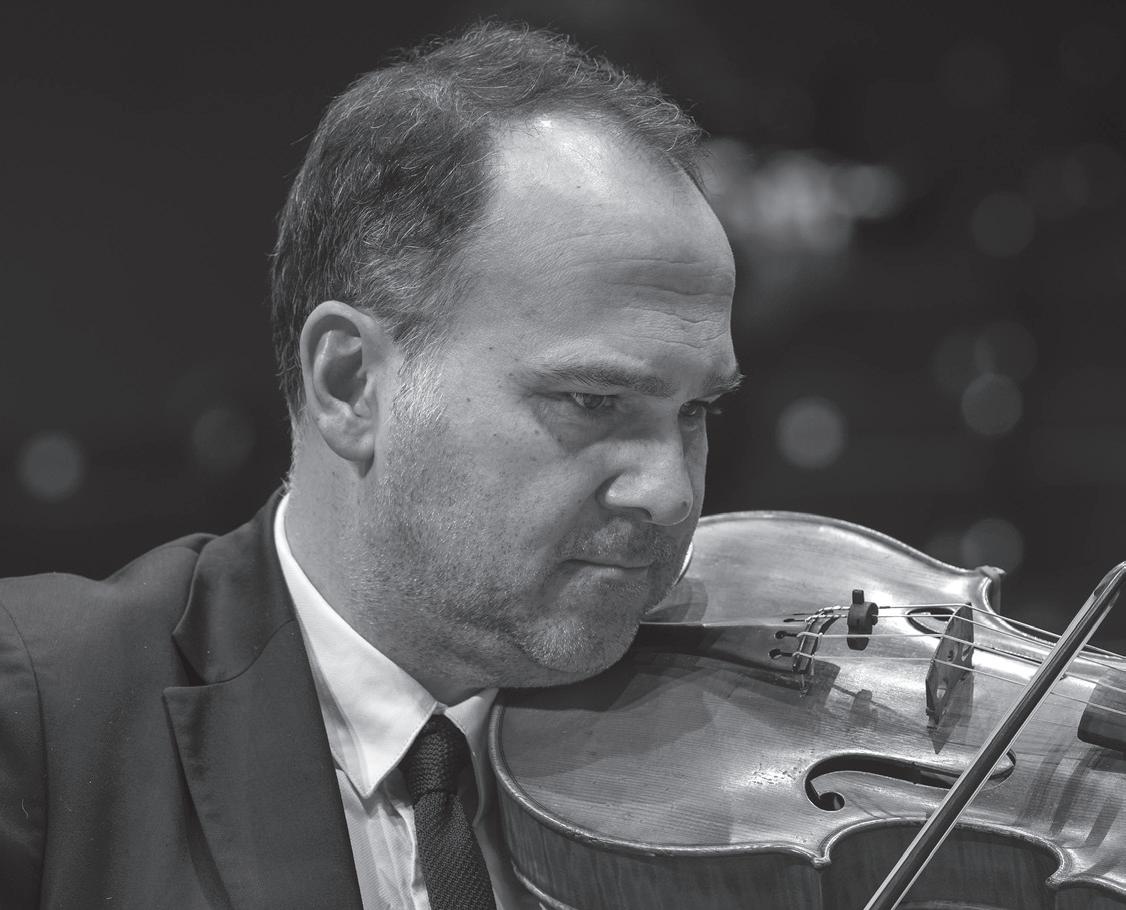
What You Are About To Hear
BERLIOZ (1803-1869)
L'Enfance du Christ, Op. 25 (1850–54)
Part I: Le Songe d'Hérode (Herod's Dream)
Part 2: La Fuite en Égypte (The Flight to Egypt)
Part 3: L'Arrivée à Saïs (The Arrival at Sais)
Interval of 20 minutes after Part 1
Hector Berlioz was hardly a composer to shy away from creative spontaneity, even impulsiveness. For example, he created his most famous work – the autobiographical Symphonie fantastique – in a feverish sixweek burst of energy, virtually laying out his personal life and his romantic obsessions for all to hear. But even for a composer so confident in his gut instincts and his spontaneous abilities, his L’Enfance du Christ had an unusual genesis: it came about almost by accident, bit by bit, and as a response to the encouragement of others.
Seldom a musician lacking belief in his own genius, Berlioz had been adored at performances of many of his earlier works outside his native France, notably in England and what’s now Germany. He remained deeply troubled, however, and more than a little frustrated that he’d yet to win over audiences in his home city of Paris to his pioneering creations. It was perhaps not entirely surprising, however, that listeners closer to home had their reservations about Berlioz. He was notorious for being difficult to work with – which in the early 19th century meant demanding high standards and deep commitment from musicians in his unusually complex music, when they’d been used to taking it easy in far more straightforward repertoire. Parisian audiences had long been passionately in love with Italian opera, and frankly preferred concert music that was easy to digest, while Berlioz’s great hero was Beethoven, the rugged, uncompromising, heroic figure who wrote thorny, demanding pieces that listeners in the French capital enjoyed, but perhaps preferred to admire from afar.
Things came to a head in 1846, with a concert performance of Berlioz’s long, lavish opera La damnation de Faust at the Opéra-Comique
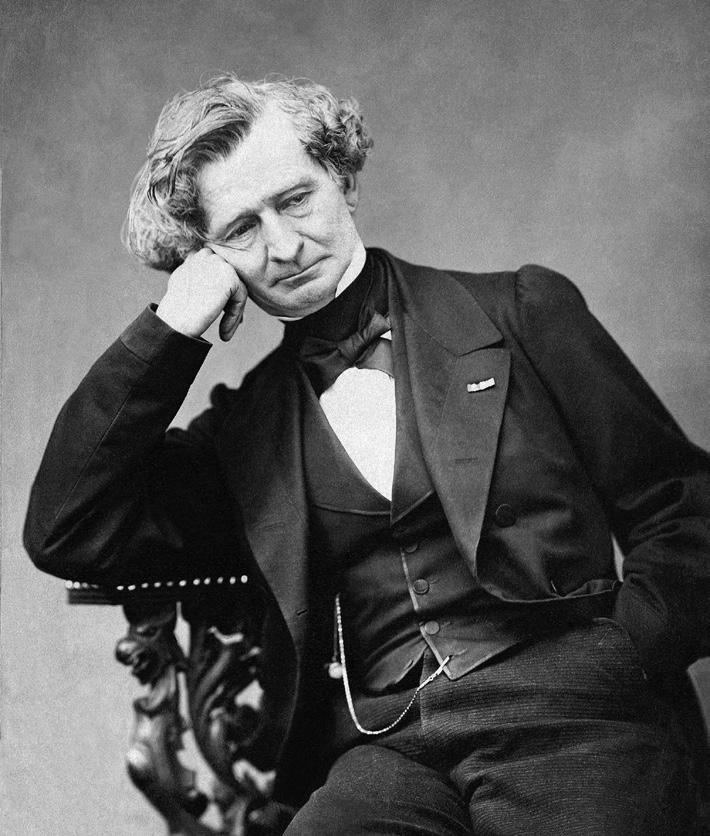
Berlioz’s towering creation received what amounted to a shrug. ‘Nothing in my career as an artist wounded me more deeply than this unexpected indifference,’ Berlioz later remembered in his Memoirs.
in Paris. It didn’t go down well – but worse even than a barrage of audience disapproval, Berlioz’s towering creation received what amounted to a shrug. ‘Nothing in my career as an artist wounded me more deeply than this unexpected indifference,’ Berlioz later remembered in his Memoirs. It was to be the final (well, ‘final’) straw: he vowed never to put on another large-scale work in Paris.
That was until L’Enfance du Christ, however, which seemed to reignite Parisian interest in the city’s most pioneering resident musician – mainly, Parisian listeners felt, because Berlioz had changed, embracing a gentler, more human perspective, and turning away from the gargantuan monumentalism of his earlier creations. Berlioz, however, felt rather differently about things.
But we’ll return to that later. Before L’Enfance du Christ existed, and when Berlioz had still
had it with Parisian disapproval, the piece’s initial ideas began life as an elaborate hoax against the city’s audiences and critics. In October 1850, during an evening playing cards with a friend, architect Pierre Duc, Berlioz scribbled down a throwaway bit of music. He later recounted: ‘I take a scrap of paper and draw a few staves on which in a little while an Andantino in four parts for organ makes its appearance. I find a certain character of naive, rustic devotion in it and promptly decide to add some words in the same vein. The organ piece disappears and becomes the chorus of the shepherds of Bethlehem saying goodbye to the child Jesus at the moment when the Holy Family are setting out on their journey to Egypt.’
Berlioz’s hastily scribbled ideas quickly became the ‘Adieu des Bergers à la Sainte Famille’ (or ‘The Shepherds’ Farewell to the Holy Family’), and within a few months,
Hector Berlioz
Berlioz had added an orchestral overture and a subsequent movement, ‘Le Repos de la Sainte Famille’ (‘The Repose of the Holy Family’). On 12 November 1850, he conducted the ‘Adieu des Bergers’ at one of the concerts given by his Société Philharmonique orchestra and chorus, but without taking credit for the piece’s creation. Instead, he attributed it to the shady and entirely fictional figure of Pierre Ducré, purportedly master of music at Paris’ SainteChappelle some time in the 17th century, whose name was clearly a nod to his old friend Pierre Duc. Parisian listeners fell for Berlioz’s ruse, and one woman reportedly told Duc: ‘Berlioz would never be able to write a tune as simple and charming as this little piece by old Ducré.’ So too did the Parisian musical press: a reviewer for the Ménéstrel reported that the piece ‘breathed a fragrance of archaic style and naivety which was not devoid of charm’, while the Revue et Gazette Musicale critic, perhaps more suspiciously, wrote: ‘The piece seemed to me quite pretty, and modulated [changed key] rather felicitously for a period when composers did not modulate.’
If Berlioz believed that Parisians disliked him personally more than they disliked his music, then he felt his point had been proven. To that end, he felt entirely justified in admitting the hoax: when the trio of pieces were published as La Fuite en Égypte (‘The Flight into Egypt’) in 1852, they were described as ‘Fragments of a Mystery in antique style, attributed to Pierre Ducré, imaginary master of music at the Sainte-Chapelle, and composed by Hector Berlioz’.
Berlioz premiered the complete La Fuite en Égypte in Leipzig in December 1853, to a rapturous reception (even the 20-yearold Johannes Brahms, who happened to
be there, loved it). German friends and supporters begged Berlioz to expand the piece. Flattered, he readily agreed, completing its sequel, ‘L’Arrivée à Saïs’ (‘The Arrival in Sais’), and its prequel, ‘Le Songe d’Hérode’ (‘Herod’s Dream’) by the summer of 1854, basing all three parts of his trilogy on Biblical sources but employing his own self-written libretto throughout.
Together, these three large-scale panels would form L’Enfance du Christ, which received its first complete performance, under Berlioz’s baton, at the Salle Herz in Paris on 10 December 1854. It was an astonishing and – even for Berlioz –somewhat overwhelming success. So oversubscribed was the concert that two additional performances had to be hastily arranged. The composer/conductor reportedly took no fewer than 20 curtain calls after the first performance. And he was forced to repeat ‘Le Repos de la SainteFamille’ in its entirety since the effusive acclaim it generated had drowned out its ending. Berlioz turned to the audience and begged: ‘we're going to play the piece again, but this time please allow it to finish.’
All of a sudden, Paris loved Berlioz, and he was grateful for the long-awaited recognition. Well, up to a point. He also held a deep resentment that this new love towards him seemed to be based on the notion that he’d changed his musical style, creating music that was simpler and more heartfelt, when he felt little had changed at all. He wrote about L’Enfance du Christ in his Memoirs: ‘in that work many people imagined they could detect a radical change in my style and manner. This opinion is entirely without foundation. The subject naturally lent itself to a gentle and simple style of music, and for that reason alone
All of a sudden, Paris loved Berlioz, and he was grateful for the long-awaited recognition. Well, up to a point. He also held a deep resentment that this new love towards him seemed to be based on the notion that he’d changed his musical style, creating music that was simpler and more heartfelt, when he felt little had changed at all.
was more in accordance with their taste and intelligence. Time would probably have developed these qualities, but I should have written L’Enfance du Christ in the same manner 20 years ago.’
Nonetheless, the appreciation and acclaim that Berlioz gained as a result of L’Enfance du Christ’s enormous success did act as a spur for further composition – most specifically, for the gargantuan opera Les Troyens, arguably his most ambitious and monumental achievement. That work’s 1863 premiere, however, generated for Berlioz precisely the same kind of cool, semi-polite indifference he’d encountered almost two decades previously with La damnation de Faust But that’s another story. Unlike Les Troyens or La damnation de Faust, Berlioz never considered L’Enfance du Christ to be a stage
work (which hasn’t stopped the odd opera company giving it a staged production). That said, he couldn’t help his dramatic instincts making their mark on the work. His characters are deftly described through music, and his pacing and building of tension – especially in the work’s opening section, based around Herod’s Massacre of the Innocents – is sure and effective. Indeed, L’Enfance du Christ has even been considered as a forerunner of cinema, in its focus on key moments in the story of the Nativity and the flight into Egypt, rather than an attempt to paint in every detail, and in its distinctively cinematic musical closeups on individual characters and its zoomsout to take in broader scenes.
Perhaps inspired by Bach’s St Matthew Passion – which Berlioz enjoyed hearing during a visit to Berlin in 1840 (even if he couldn’t abide the clattering of the
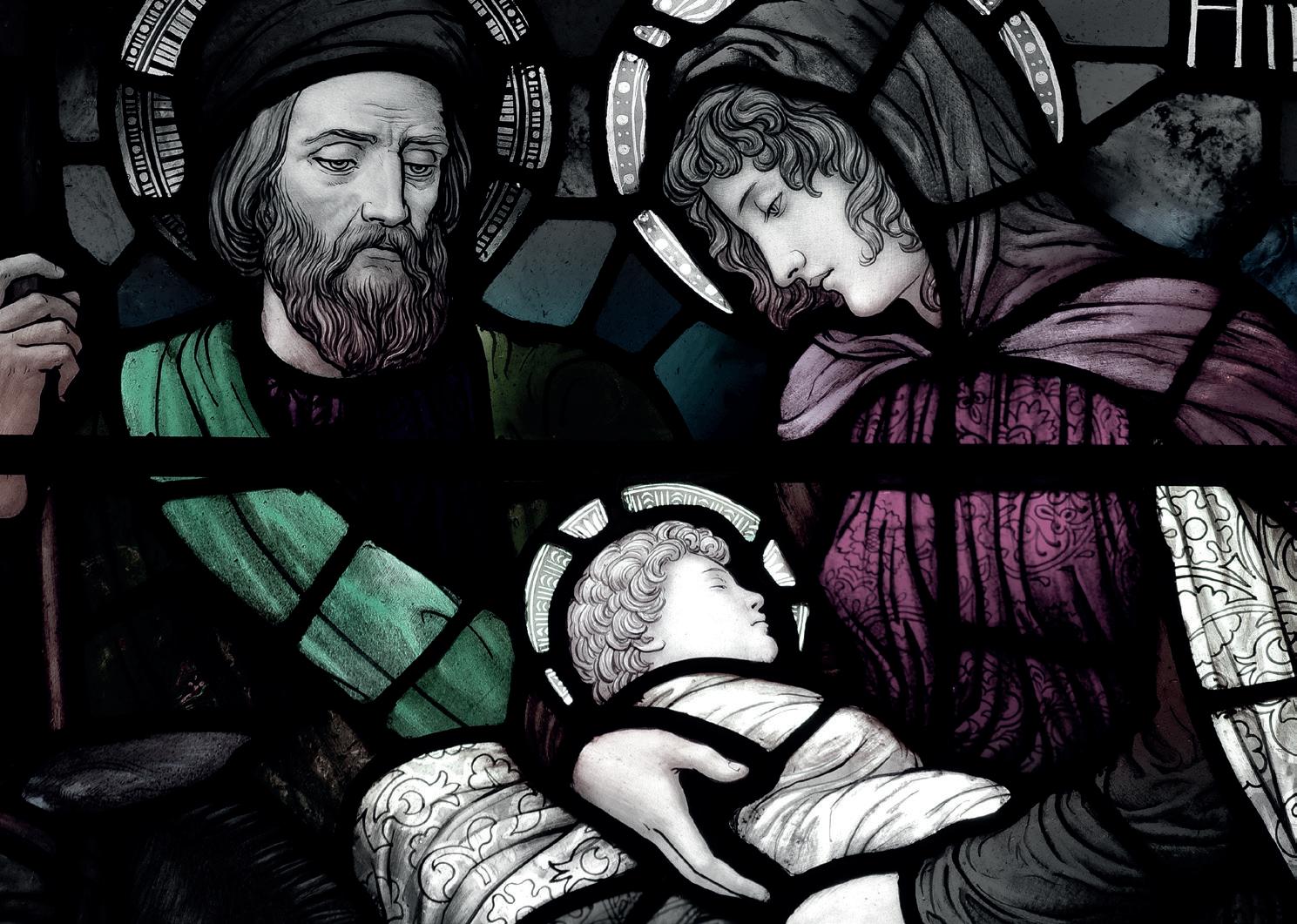
harpsichord) – L’Enfance du Christ uses a tenor narrator throughout to explain the storyline and keep the action moving along. The narrator throws us straight into that story at the opening of Part One, ‘Le Songe d’Hérode’, describing Christ’s birth, before a ‘Marche nocturne’ depicts soldiers patrolling Herod’s palace at night. In a long solo aria, the King complains of his terrors about a child who will overthrow him, then explains his fears to a trio of Jewish soothsayers. After a wild dance in an unusual seven-beat time, the soothsayers confirm that Herod’s dream is true, and advise him to kill all newborns. Herod agrees. Part One ends, however, by panning across to the Holy Family with the newborn Christ in the stable, who are warned of the approaching massacre by unseen angels, and prepare to flee.
Part Two, ‘La Fuite en Égypte’, begins with an orchestral overture, before the Nativity
shepherds bid farewell to the Holy Family in L’Enfance du Christ’s most famous movement. It closes with Mary, Joseph and the baby Jesus resting in the shade of a tree.
In Part Three, ‘L’Arrivée à Saïs’, the Holy Family has reached Egypt, where two households refuse to help them on religious grounds, in language that would be deemed unacceptable today. A family of Ishmaelites, however, take pity on the weary travellers and invite them into their home, where they are fed and entertained (in an instrumental trio for two flutes and harp, a rare piece of chamber music by Berlioz, intended to evoke the sounds of the ancient world). L’Enfance du Christ closes with a reverential Epilogue, in which the tenor narrator describes Christ’s early years in Egypt, and a serene unaccompanied closing hymn.
© David Kettle
Synopsis
Part I: Herod’s Dream
After a prologue in which the Narrator tells us the birth of Christ has brought fear to the mighty and hope to the weak, the scene changes to Jerusalem. In a street, two soldiers grumble about having to watch over Herod, while inside his palace, the latter’s sleep is disturbed by a recurring dream. He calls for his soothsayers and asks if the repeated warnings of a newborn child who will usurp both his throne and his power are to be taken seriously. The soothsayers perform a ritual before confirming that the King’s dream rings true. Although they are unable to identify the child, they recommend Herod orders the death of all newborn children. He agrees, giving instructions for the Massacre of the Innocents. Meanwhile, in a stable in Bethlehem, Mary and Joseph are watching over their child when unseen angels warn them of the imminent danger and advise them to flee to Egypt without delay.
Part 2: The Flight into Egypt
The shepherds bid a fond farewell to the Holy Family. The Narrator takes up the story again: the travellers have reached an oasis where they rest, overseen by angels.
Part 3: The Arrival at Sais
The Holy Family journeys across the desert for three days before reaching Sais, by which time even Mary is struggling to keep going. Inside the city, they twice fail to find shelter before an Ishmaelite father takes pity on them. He welcomes Joseph, Mary and Jesus into his household, where he instructs his children and servants to see to their needs. Finding out that Joseph is a carpenter like him, he offers him work and the whole family shelter. The evening is rounded off by his children playing music for their guests, moving Mary to tears, and the Holy Family retires for the night.
In an epilogue, we learn that they stayed in Egypt for ten years before returning home, where Christ would later redeem humanity through his sacrifice. Narrator and Chorus reflect that pride has no place before such a great mystery: we can only pray for our hearts to be filled with love.
Libretto
BERLIOZ (1803-1869)
L'Enfance du Christ, Op. 25 (1850–54)
Première Partie: Le Songe d’Hérode
PROLOGUE
Le Récitant
Dans la crèche, en ce temps, Jésus venait de naître,
Mais nul prodige encore ne l’avait fait connaître;
Et déjà les puissants tremblaient, Déjà les faibles espéraient.
Tous attendaient…
Or, apprenez, Chrétiens, quel crime épouvantable
Au roi des Juifs alors suggéra la terreur, Et le céleste avis que, dans leur humble étable, Aux parents de Jésus envoya le Seigneur.
....
SCÈNE 1
UneruedeJérusalem.Uncorpsdegarde. Soldats romains faisant la ronde de nuit.
Marche Nocturne
Un Centurion
Qui vient ?
Polydorus Rome.
Le Centurion Avancez !
Part 1: Herod’s Dream
PROLOGUE
Narrator
At that time Jesus had just been born in the manger; but no miracle had yet made him known.
Already the mighty trembled, Already the weak had hope. Everyone was waiting … Now hear, Christian folk, by what dreadful crime Terror came to the mind of the king of the Jews, And what heavenly counsel the Lord sent to Jesus’s parents in their lowly stable. ....
SCENE 1
A street in Jerusalem. A guardhouse. Roman soldiers on night patrol.
Nocturnal March
A Centurion
Who goes there?
Polydorus Rome.
Centurion
Come forward!
Polydorus
Halte !
Le Centurion
Polydorus !
Je te croyais déjà, soldat, aux bords du Tibre.
Polydorus
J’y serais en effet, si Gallus, votre illustre
Préteur, m’eût enfin laissé libre.
Mais il m’a sans raison
Imposé pour prison
Cette triste cité, pour y voir ses folies, Et d’un roitelet juif garder les insomnies.
Le Centurion
Que fait Hérode ?
Polydorus
II rêve, il tremble, II voit partout des traîtres, il assemble
Son conseil chaque jour; et du soir au matin
Il faut sur lui veiller: il nous obsède enfin.
Le Centurion
Ridicule tyran ! Mais va, poursuis ta ronde.
Polydorus
Il le faut bien. Adieu ! Jupiter le confonde !
La patrouille se remet en marche et s’éloigne
Polydorus
Halt!
Centurion
Polydorus! Soldier, I thought you were already back in Rome.
Polydorus
So I would be had Gallus, our illustrious Praetor, allowed it.
But – for no good reason –He has forced me to stay In this dreary city, to observe its follies, and watch over an insomniac little Jewish king.
Centurion
What’s Herod doing?
Polydorus
He dreams, trembles, Sees traitors everywhere, summons his Council every day, and must be watched All night; he’s getting on our nerves.
Centurion
What an absurd tyrant! But go, continue your patrol.
Polydorus
Yes, I must. Farewell! Jove confound the man!
The patrol resumes its march and moves off.
SCÈNE 2
L’intérieurdupalaisd’Hérode
Hérode
Toujours ce rêve! encore cet enfant
Qui doit me détrôner.
Et ne savoir que croire
De ce présage menaçant
Pour ma vie et ma gloire !
Ô misère des rois !
Régner et ne pas vivre !
A tous donner des lois,
Et désirer de suivre
Le chevrier au fond des bois !
Ô nuit profonde
Qui tiens le monde
Dans le repos plongé,
A mon sein ravagé
Donne la paix une heure,
Et que ton voile effleure
Mon front d’ennuis chargé.
Ô misère des rois !, etc.
Effort stérile !
Le sommeil fuit ;
Et ma plainte inutile
Ne hâte point ton cours, interminable nuit.
....
SCÈNE 3
Polydorus
Seigneur !
Hérode
Lâches, tremblez !
Je sais tenir encore une épée ...
Polydorus
Arrêtez !
Hérode (le reconnaissant)
Ah ! c’est toi, Polydore !
Que viens-tu m’annoncer ?
....
SCENE 2
In Herod’s palace
Herod
Still that same dream, and that same child who is to usurp me.
I don’t know what to make
Of this omen which threatens
My life and my reputation!
O misery of kingship!
To reign without living!
Imposing laws
While longing to follow the goatherd into the depths of the forest!
O darkest night,
Which keeps the world
In deep sleep,
Grant but one hour’s peace
To my troubled soul, and let thy shadows touch my gloom-pressed brow.
O misery of kingship! etc.
It’s pointless!
Sleep won’t come;
And my futile complaints
Are not hastening your course, endless night.
....
SCENE 3
Polydorus
My lord!
Herod
Cowards, beware!
I can still handle a sword ...
Polydorus
Stop!
Herod (recognising him)
Oh it’s you, Polydorus!
What have you come to tell me?
Polydorus
Seigneur, les devins juifs viennent de s’assembler par vos ordres.
Hérode
Enfin !
Polydorus
Ils sont là.
Hérode
Qu’ils paraissent.
....
SCÈNE 4
Les Devins
Les sages de Judée, Ô roi, te reconnaissent
Pour un prince savant et généreux ; Ils te sont dévoués ;
Parle, qu’attends-tu d’eux ?
Hérode
Qu’ils veuillent m’éclairer.
Est-il quelque remède
Au souci dévorant
Qui dès longtemps m’obsède ?
Les Devins
Quel est-il ?
Polydorus
My lord, the Jewish soothsayers have come together as you ordered.
Herod Finally!
Polydorus
They are here.
Herod Bring them to me.
SCENE 4
Soothsayers
The wise men of Judea, O King, recognise in you
A wise and generous prince; They are your servants; Speak, what do you want from them?
Herod
That they enlighten me. Is there any remedy
To the gnawing concern Which has long been consuming me?
Soothsayers
What is it?
Hérode
Chaque nuit,
Le même songe m’épouvante ;
Toujours une voix grave et lente
Me répète ces mots:
‘Ton heureux temps s’enfuit !
Un enfant vient de naître
Qui fera disparaître
Ton trône et ton pouvoir’.
Puis-je de vous savoir
Si cette terreur qui m’accable
Est fondée,
Et comment ce danger redoutable
Peut être détourné ?
Les Devins
Les esprits le sauront, Et, par nous consultés,
Bientôt ils répondront.
(Les Devins font des évolutions cabalistiques et procèdent à la conjuration)
Les Devins
La voix dit vrai, Seigneur.
Un enfant vient de naître
Qui fera disparaître
Ton trône et ton pouvoir.
Mais nul ne peut savoir
Ni son nom, ni sa race.
Hérode
Que faut-il que je fasse ?
Les Devins
Tu tomberas, à moins que l’on ne satisfasse
Les noirs esprits, et si, pour conjurer le sort,
Des enfants nouveaux-nés tu n’ordonnes la mort.
Herod
Every night
I am terrorised by the same dream; A deep and solemn voice
Repeats these words:
‘Your good fortune will soon be gone! A child has been born, Set to destroy Your throne and your position.’
Tell me
If there are grounds for this terror
That oppresses me
And how this fearful danger Can be avoided?
Soothsayers
The spirits will know; Let us consult them, They will answer promptly.
(The soothsayers perform a cabalistic ritual, then proceed to conjure the spirits.)
Soothsayers
The voice speaks true, O King. A child has been born, Set to destroy Your throne and your position. But there is no telling his name or his race.
Herod
What should I do?
Soothsayers
You will fall unless the dark spirits Are appeased and, to confound fate, You order the death of all newborn children.
Hérode
Eh bien, par le fer qu’ils périssent !
Je ne puis hésiter.
Que dans Jérusalem,
A Nazareth, à Bethléem,
Sur tous les nouveaux-nés
Mes coups s’appesantissent !
Malgré les cris, malgré les pleurs
De tant de mères éperdues,
Des rivières de sang vont être répandues,
Je serai sourd à ces douleurs.
La beauté, la grâce, ni l’âge
Ne feront faiblir mon courage:
Il faut un terme à mes terreurs !
Les Devins
Oui, oui, par le fer qu’ils périssent !
N’hésite pas.
Que dans Jérusalem
A Nazareth, à Bethléem,
Sur tous les nouveaux-nés
Tes coups s’appesantissent !
Malgré les cris, malgré les pleurs
De tant de mères éperdues,
Les rivières de sang qui seront répandues,
Demeure sourd à ces douleurs ;
Que rien n’ébranle ton courage !
Et vous, pour attiser sa rage, Esprits, redoublez ses terreurs.
Hérode
Non, non, que dans Jérusalem, etc.
SCÈNE 5
L’étable de Bethléem
Sainte Marie
O mon cher fils, donne cette herbe tendre
A ces agneaux qui vers toi vont bêlant ;
Ils sont si doux ! laisse, laisse-les prendre,
Ne les fais pas languir, ô mon enfant.
Herod
Very well, may they perish by the sword! I cannot allow myself to hesitate.
In Jerusalem, Nazareth and Bethlehem, May my blows strike
All newborns!
Despite the cries and tears
Of all their despairing mothers, Rivers of blood shall flow, I will be impervious to their suffering. Neither beauty, charm, nor youth
Shall shake my resolve.
My terrors must come to an end!
Soothsayers
Yes, may they perish by the sword! Do not hesitate.
In Jerusalem, Nazareth and Bethlehem, May your blows strike
All newborns!
Despite the cries and tears
Of all their despairing mothers, Rivers of blood shall flow, Be impervious to their suffering. May nothing shake your resolve!
And you, spirits, to kindle his rage, Multiply his terrors.
Herod
No, no, in Jerusalem, etc.
SCENE 5
The stable at Bethlehem
Mary
O my dear son, give this fresh grass
To these lambs that come to you bleating; They are so gentle! Let them take it, Do not deny them their food, my child.
Sainte Marie, Saint Joseph
Répands encore ces fleurs sur leur litière. Ils sont heureux de tes dons, cher Enfant ; Vois leur gaîeté, vois leurs jeux, vois leur mère
Tourner vers toi son regard caressant.
Sainte Marie
Oh ! sois béni, mon cher et tendre Enfant !
Saint Joseph
Oh ! sois béni, divin Enfant !
SCÈNE 6
Chœur d’Anges invisibles
Joseph ! Marie !
Écoutez-nous !
Sainte Marie, Saint Joseph Esprits de vie, Est-ce bien vous ?
Les Anges
II faut sauver ton fils
Qu’un grand péril menace, Marie.
Sainte Marie
Ô ciel ! mon fils !
Les Anges
Oui, vous devez partir, Et de vos pas bien dérober la trace ; Dès ce soir au désert vers l’Egypte il faut fuir.
Sainte Marie, Saint Joseph
A vos ordres soumis, purs esprits de lumière, Avec Jésus au désert nous fuirons.
Mais accordez à notre humble prière
La prudence, la force, et nous le sauverons.
Mary, Joseph
Spread these flowers on their straw. They are pleased with your gifts, dear child; See how happy they are, how they play, and how their mother Turns her tender gaze to you.
Mary
May you be blessed, my dear sweet child!
Joseph
May you be blessed, holy child!
SCENE 6
Choir of Unseen Angels
Joseph! Mary! Listen to us!
Mary, Joseph
Spirits of life, Is that really you?
Angels
You must save your son, Mary, he is in grave danger.
Mary Heavens! My son!
Angels
Yes, you must leave this place and leave no trace behind you; You must set off through the desert towards Egypt this very evening.
Mary, Joseph
We will obey your orders, pure spirits of light, And flee into the desert with Jesus. Grant us our humble prayer for Wisdom and strength, so we will save him.
Les Anges
La puissance céleste
Saura de vos pas écarter
Toute encontre funeste.
Sainte Marie, Saint Joseph
En hâte allons tout préparer.
Les Anges
Hosanna ! Hosanna !
ENTRACTE
Deuxième partie: La Fuite en Égypte
Ouverture
Les Bergers se rassemblent auprès de l’étable de Bethléem
L’Adieu des Bergers à la Sainte Famille
Chœur des Bergers
Il s’en va loin de la terre
Où dans l’étable il vit le jour,
De son père et de sa mère
Qu’il reste le constant amour,
Qu’il grandisse, qu’il prospère
Et qu’il soit bon père à son tour.
Oncques si, chez l’idolâtre, II vient à sentir le malheur,
Fuyant la terre marâtre,
Chez nous qu’il revienne au bonheur.
Que la pauvreté du pâtre
Reste toujours chère à son cœur.
Cher enfant, Dieu te bénisse !
Dieu vous bénisse, heureux époux !
Que jamais de l’injustice
Vous ne puissiez sentir les coups.
Qu’un bon ange vous avertisse
Des dangers planant sur vous.
Angels
The power of heaven
Will keep from your path
All fatal encounters.
Mary, Joseph
Let us make haste to get ready.
Angels
Hosanna! Hosanna!
INTERVAL
Part Two: The Flight into Egypt
Overture
The shepherds gather before the stable at Bethlehem.
The Shepherds’ Farewell to the Holy Family
Chorus of Shepherds
He is going far from the place where in the stable he was born; May he always be beloved
Of his father and his mother, May he grow and prosper
And be a good father in his turn.
Should he ever find misfortune
Among fanatics
And flee their unwelcoming home
May he may happiness among us again.
May the lowly life of the shepherd
Stay always dear to his heart.
Dear child, God bless you!
God bless you, happy pair!
May fate always preserve you
From the blows of injustice.
May a good angel warn you
Of any danger that hangs over you.
Le Repos de la Sainte Famille
Le Récitant
Les pèlerins étant venus
En un lieu de belle apparence, Où se trouvaient arbres touffus
Et de l’eau pure en abondance, Saint Joseph dit : ‘Arrêtez-vous
Près de cette claire fontaine, Après si longue peine Ici reposons-nous.’
L’enfant Jésus dormait. Pour lors Sainte Marie, Arrêtant l’âne, répondit : 'Voyez ce beau tapis d’herbe douce et fleurie, Le Seigneur pour mon fils au désert l’étendit.'
Puis, s’étant assis sous l’ombrage
De trois palmiers au vert feuillage
L’âne paissant,
L’enfant dormant,
Les sacrés voyageurs quelque temps sommeillèrent,
Bercés par des songes heureux,
Et les anges du ciel, à genoux autour d’eux,
Le divin enfant adorèrent.
Les Anges
Alleluia ! Alleluia !
The Holy Family at Rest
Narrator
The pilgrims having come
To a beautiful place
With leafy trees
And an abundance of fresh water, Joseph said: ‘Let us stop
By this clear spring,
Let us rest here
From our long travails.’
The child Jesus was sleeping. Then Mary, Halting their donkey, answered: 'Look at this fair carpet of soft, flowery grass
The Lord has brought it forth in the desert for my son.'
Then, having sat down in the shade
Of three green-leaved palm trees,
The donkey grazed,
The child slept,
The holy travellers slumbered some time,
Soothed by sweet dreams,
And the heavenly angels, kneeling all around them,
Worshipped the divine child.
Angels
Alleluia! Alleluia!
Troisième partie: L’Arrivée à Saïs
Le Récitant
Depuis trois jours, malgré l’ardeur du vent, Ils cheminaient dans le sable mouvant.
Le pauvre serviteur de la famille sainte, L’âne, dans le désert, était déjà tombé ;
Et, bien avant de voir d’une cité l’enceinte, De fatigue et de soif son maître eût succombé
Sans le secours de Dieu.
Seule Sainte Marie
Marchait calme et sereine, et de son doux enfant
La blonde chevelure et la tête bénie
Semblaient la ranimer, sur son cœur reposant.
Mais bientôt ses pas chancelèrent…
Combien de fois les époux s’arrêtèrent…
Enfin pourtant, ils arrivèrent
A Saïs, haletants, Presque mourants.
C’était une cité dès longtemps réunie
A l’Empire romain,
Pleine de gens cruels, au visage hautain.
Oyez combien dura la navrante agonie
Des pèlerins cherchant un asile et du pain.
SCÈNE 1
L’intérieur de la ville de Saïs
Sainte Marie
Dans cette ville immense
Où le peuple en foule s’élance, Quelle rumeur !
Joseph ! j’ai peur…
Je n’en puis plus... hélas !... je suis morte...
Allez frapper à cette porte.
Part Three: The Arrival at Sais
Narrator
For three days, despite the heat of the winds, They pushed on through the shifting sands.
The Holy Family’s unfortunate servant, The donkey, had already collapsed in the desert sands;
And long before a city’s walls came into view, His master would have succumbed to exhaustion and thirst
Without for God’s help.
Only Mary
Walked on serene and serene, and her sweet child’s
Fair hair and and blessed head, Resting against her breast, seemed to sustain her.
But her steps grew unsteady …
How many times the couple stopped…
Finally they reached Sais, gasping, Almost dying.
It was a city that had long been taken over By the Roman Empire, Full of cruel, disdainful people.
Hear now how the pilgrims’ dreadful agony
Was prolonged as they sought food and shelter.
SCENE 1
Within the walls of Sais
Mary
Just listen to the noise
Of this huge town
Filled with impatient crowds!
Joseph, I’m afraid...
I can’t go any further... alas... I’m dying... Go and knock at that door.
Saint Joseph
Ouvrez, ouvrez, secourez-nous,
Laissez-nous reposer chez vous !
Que l’hospitalité sainte soit accordée
A la mère, à l’Enfant. Hélas ! de la Judée
Nous arrivons à pied.
Chœur
Arrière, vils Hébreux !
Les gens de Rome n’ont que faire
De vagabonds et de lépreux !
Sainte Marie
Mes pieds de sang teignent la terre !
Saint Joseph
Seigneur ! ma femme est presque morte !
Sainte Marie
Jésus va mourir... c’en est fait.
Mon sein tari n’a a plus de lait !
Saint Joseph
Frappons encore à cette porte.
Oh ! par pitié, secourez-nous !
Laissez-nous reposer chez vous !
Que l’hospitalité sainte soit accordée
A la mère, à l’Enfant ! Hélas ! de la Judée
Nous arrivons à pied.
Chœur
Arrière, vils Hébreux !
Les gens d’Égypte n’ont que faire
De vagabonds et de lépreux !
Joseph
Open up, open up, help us,
Give us leave to rest in your house!
Grant blessed hospitality
To mother and child! Alas, we have come On foot from Judea.
Chorus
Go away, vile Jews!
We Romans have no need of Vagrants and lepers!
Mary
Blood is seeping from my feet into the ground!
Joseph
Good master! My wife is close to death!
Mary
Jesus is going to die... all is lost.
My breast has run dry, I can give him no milk.
Joseph
Let us knock at this door.
Oh, have pity, help us!
Give us leave to rest in your house!
Grant blessed hospitality
To mother and child! Alas, we have come On foot from Judea.
Chorus
Go away, vile Jews!
We Egyptians have no need of Vagrants and lepers!
Saint Joseph
Seigneur ! sauvez la mère !
Marie expire... c’en est fait...
Et son Enfant n’a plus de lait.
Votre maison, cruels, reste fermée.
Vos cœurs sont durs. Sous la ramée
De ces sycomores, l’on voit
Tout à l’écart un humble toit...
Frappons encore... Mais qu’à ma voix unie, Votre voix si douce, Marie,
Tente aussi de les attendrir.
(Il se dirige vers la maison au loin.)
Sainte Marie
Hélas ! nous aurons à souffrir
Partout l’insulte et l’avanie !
Je vais tomber...
Saint Joseph
Oh ! par pitié !
Sainte Marie, Saint Joseph
Oh, par pitié, secourez-nous,
Laissez-nous reposer chez vous !
Que l’hospitalité sainte soit accordée
Aux parents, à l’enfant ! Hélas! de la Judée
Nous arrivons à pied.
SCÈNE 2
L’intérieur de la maison des Ismaélites
Le Père de Famille
Entrez, pauvres Hébreux :
La porte n’est jamais fermée
Chez nous aux malheureux.
Pauvres Hébreux, entrez, Entrez, entrez !
(Joseph et Marie entrent)
Joseph
Good master, save the mother!
Mary is fainting... all is lost ... And her child has no more milk. Cruel people, your door stays closed.
You are hard-hearted. Beneath the branches Of those sycamores, there is A lowly dwelling, set apart from the others... Let us knock there... But Mary, Entreat them with me, Your gentle voice may move them.
(He goes towards the distant house)
Mary
Alas, we are to be Insulted and snubbed everywhere! I am on the verge of collapse...
Joseph Oh, have pity!
Mary, Joseph
Oh, have pity, help us, Give us leave to rest in your house! Grant blessed hospitality
To mother and child! Alas, we have come On foot from Judea.
SCENE 2
Inside the lshmaelites’ house
The father
Come in, you poor Jews! The door of our house is never Closed to the unfortunate. Poor Jews, come in, come in, come in!
(Joseph and Mary enter.)
Le Père de Famille
Grands Dieux ! Quelle détresse !
Qu’autour d’eux on s’empresse !
Filles et fils et serviteurs,
Montrez la bonté de vos cœurs !
Que de leurs pieds meurtris on lave les blessures !
Donnez de l’eau, donnez du lait, des grappes mûres ; Préparez à l’instant
Une couchette pour l’enfant.
Chœur d’Ismaélites
Que de leurs pieds meurtris on lave les blessures !
Donnons de l’eau, donnons du lait, des grappes mûres ; Préparons à l’instant
Une couchette pour l’enfant.
(Les jeunes Ismaélites et leurs domestiques s’égaillent à travers la maison pour transmettre les ordres du père.)
Le Père de Famille
Sur vos traits fatigués
La tristesse est empreinte;
Ayez courage, nous ferons
Ce que nous pourrons
Pour vous aider.
Bannissez toute crainte; Les enfants d’Ismaël
Sont frères de ceux d’lsraël.
Nous avons vu le jour au Liban, en Syrie. Comment vous nomme-t-on ?
Saint Joseph
Elle a pour nom Marie, Je m’appelle Joseph, et nous nommons l’Enfant Jésus.
The father
Ye Gods, what an unhappy sight!
See to their needs, quickly!
Son and daughters and servants, Show the kindness of your hearts!
Bathe the wounds of their bruised feet!
Give them water, give them milk, ripe grapes; Make up a bed
At once for the child.
Chorus of Ishmaelites
Let us bathe the wounds of their bruised feet!
We shall give them water, give them milk, ripe grapes;
And make up a bed
At once for the child.
(The young Ishmaelites and their servants rush around the house, carrying out the father’s orders.)
The father
There is such sadness
In your tired faces. Take heart, we’ll do
What we can
To help you.
Banish all your fears; The children of Ishmael
Are brethren to the children of Israel. We were born in Lebanon, in Syria.
What are your names?
Joseph
Her name is Mary, I’m Joseph, and we have named the child Jesus.
Le Père de Famille
Jésus ! Quel nom charmant !
Dites, que faites-vous pour gagner votre vie?
Oui, quel est votre état ?
Saint Joseph
Moi, je suis charpentier.
Le Père de Famille
Eh bien, c’est mon métier, Vous êtes mon compère.
Ensemble nous travaillerons, Bien des deniers nous gagnerons. Laissez faire.
Près de nous Jésus grandira, Puis bientôt il vous aidera, Et la sagesse il apprendra.
Laissez, laissez faire.
Chœur d’Ismaélites
Laissez, laissez faire.
Près de nous Jésus grandira, Puis bientôt il vous aidera, Et la sagesse il apprendra.
Le Père de Famille
Pour bien finir cette soirée
Et réjouir nos hôtes, employons
La science sacrée, Le pouvoir des doux sons.
Prenez vos instruments, mes enfants: toute peine
Cède à la flûte unie à la harpe thébaine.
Trio pour deux flûtes et harpe
The father
Jesus! What a lovely name! Tell me, what do you do for a living? What is your trade?
Joseph
I am a carpenter.
The father
Why, that’s my job, We are allies. Let us work together, And make a good deal of money. Don’t worry.
Jesus will grow up among us, Soon he will help you, And learn wisdom. Please don’t worry.
Ishmaelites
No need to worry at all. Jesus will grow up among us, Soon he will help you, And learn wisdom.
The father
To round off this evening And for our guests’ pleasure, let’s use The sacred science, The power of sweet sounds.
Pick up your instruments, children; may all cares
Yield to the flute and the Theban harp.
Trio for two flutes and harp
Le Père de Famille
Vous pleurez, jeune mère.
Douces larmes, tant mieux !
Allez dormir, bon père, Bien reposez,
Mal ne songez, Plus d’alarmes.
Que les charmes
De l’espoir du bonheur
Rentrent en votre cœur.
Sainte Marie, Sainte Joseph
Adieu, merci, bon père, Déjà ma peine amère
Semble s’enfuir, S’évanouir.
Plus d’alarmes,
Oui, les charmes
De l’espoir du bonheur
Rentrent en notre cœur.
Adieu, merci, bon père.
Le Père de Famille, Chœur d’Ismaélites
Allez dormir, bon père,
Doux enfant, tendre mère.
Bien reposez,
Mal ne songez, Plus d’alarmes.
Que les charmes
De l’espoir du bonheur
Rentrent en votre cœur.
The father
You are crying, young mother. They are gentle tears; good! Go to bed, good father, Get some rest, Free of ill dreams, And concerns.
May your heart be filled With the charms Of hope and happiness.
Mary, Joseph
Good night and thank you, kind father, Already my bitter troubles
Seem to be fading, Fainting dead away. Free of concerns, Yes, may our hearts be filled With the charms Of hope and happiness. Good night and thank you, kind father.
The father, Ishmaelites
Go to bed, good father, Sweet child, gentle mother. Get some rest, Free of ill dreams, And concerns.
May your heart be filled With the charms Of hope and happiness.
ÉPILOGUE
Le Récitant
Ce fut ainsi que par un infidèle
Fut sauvé le Sauveur.
Pendant dix ans Marie, et Joseph avec elle, Virent fleurir en lui la sublime douceur, La tendresse infinie
A la sagesse unie.
Puis enfin de retour
Au lieu qui lui donna le jour, Il voulut accomplir le divin sacrifice
Qui racheta le genre humain
De l’éternel supplice, Et du salut lui fraya le chemin.
O mon âme, pour toi que reste-t-il à faire,
Qu’à briser ton orgeuil devant un tel mystère ?
Chœur
O mon âme, pour toi que reste-t-il à faire, Qu’à briser ton orgeuil devant un tel mystère !
Le Récitant, Chœur
O mon cœur, emplis-toi du grave et pur amour
Qui seul peut nous ouvrir le céIeste séjour. Amen.
Texte de Hector Berlioz
EPILOGUE
Narrator
Thus it was that the Saviour
Was saved by a non-believer. For ten years Mary, and Joseph with her, Watched sublime mildness blossom in him, Infinite tenderness
Bound up with wisdom. Then at last he returned to his birthplace, To fulfil the divine sacrifice
Which ransomed mankind from Eternal torment.
And showed the way to salvation.
O my soul, what remains for you to do but shatter your pride before so great a mystery?
Chorus
O my souI, what remains for you to do but shatter your pride before so great a mystery?
Narrator, Chorus
O my heart, be filled with the pure, deep love
Which alone can bring us to the kingdom of heaven. Amen.
Translation ©Scottish Chamber Orchestra
Conductor Maxim
Emelyanychev

Maxim Emelyanychev has been Principal Conductor of the Scottish Chamber Orchestra since 2019. He is also Chief Conductor of period-instrument orchestra Il Pomo d’Oro, and from the 2025/26 season he becomes Principal Guest Conductor of the Swedish Radio Symphony Orchestra.
Born in Nizhny Novgorod, Emelyanychev made his conducting debut at the age of 12, and later joined the class of eminent conductor Gennady Rozhdestvensky at the Moscow Conservatoire.
Emelyanychev was initially appointed as the SCO’s Principal Conductor until 2022, and the relationship was later extended until 2025 and then until 2028. He has conducted the SCO at the Edinburgh International Festival and the BBC Proms, as well as on several European tours and in concerts right across Scotland. He has also made three recordings with the SCO, of symphonies by Schubert and Mendelssohn (Linn Records).
Emelyanychev has also conducted many international ensembles including the Berlin Philharmonic, Royal Concertgebouw Orchestra, Orchestra dell'Accademia Nazionale di Santa Cecilia, Deutsches Symphonie-Orchester Berlin, Rotterdam Philharmonic Orchestra, Finnish Radio Symphony Orchestra, Seattle Symphony and Orchestra of the Age of Enlightenment. In the opera house, Emelyanychev has conducted Handel’s Rinaldo at Glyndebourne, the same composer’s Agrippina as well as Mozart’s The Magic Flute at the Royal Opera House, Covent Garden, and Mozart’s Die Entführing aus dem Serail at the Opernhaus Zürich. He has also conducted Mozart’s Die Zauberflöte and Così fan tutte with the SCO at the Edinburgh International Festival. He has collaborated closely with US soprano Joyce DiDonato, including international touring and several recordings.
Among his other recordings are keyboard sonatas by Mozart, and violin sonatas by Brahms with violinist Aylen Pritchin. He has also launched a project to record Mozart’s complete symphonies with Il Pomo d’Oro. In 2019, he won the Critics’ Circle Young Talent Award and an International Opera Award in the newcomer category. He received the 2025 Herbert von Karajan Award at the Salzburg Easter Festival.
Mary Paula Murrihy

Irish Mezzo-Soprano Paula Murrihy enjoys a busy career working at the highest level in both Europe and the US. Previously a member of Oper Frankfurt’s acclaimed ensemble, her many roles in Frankfurt include Dido in Purcell’s Dido and Aeneas, Lazuli in Chabrier’s L’étoile, Octavian in Strauss’s Der Rosenkavalier, Medoro in Vivaldi’s Orlando Furioso, creating the role of Carmen in Barrie Kosky’s iconic production of Bizet’s opera, and most recently, Dejanira in Handel’s Hercules
Murrihy opens her 2025/26 season at the Gran Teatre del Liceu, Barcelona as Fox in Barrie Kosky’s production of Janáček's The Cunning Little Vixen conducted by Josep Pons. Other opera highlights of the season include Ariane in Dukas’s Ariane et Barbe-Bleu at the Teatro Real, Madrid and the role of Euryale in the world premiere of a newly commissioned opera Medusa at the Théâtre Royal de la Monnaie, Brussels, composed by Iain Bell and directed by the opera’s librettist Lydia Steier. On the concert platform this season, Murrihy sings Goffredo in Handel’s Rinaldo with The English Concert and Harry Bicket at London’s St Martin-in-the Fields and on tour to China and South Korea. She also performs Handel’s Messiah with the Boston Baroque and Filippo Ciabatti, arias from Messiah and Bach’s St Matthew Passion with the Orchestre Symphonique de Montréal conducted by Kent Nagano and she sings the title role in Handel’s Serse with the Academy of Ancient Music and Laurence Cummings. Future plans include returns to Oper Frankfurt, La Monnaie and the Royal Opera & Ballet, Covent Garden.
An accomplished recitalist, Murrihy has given performances at London’s Wigmore Hall with both Malcolm Martineau and Sholto Kynoch, at Boston’s Jordan Hall, the Aldeburgh Festival, the Oxford Lieder Festival, Amsterdam’s Concertgebouw, Oper Frankfurt and the Diaghilev Festival in Perm. In 2020 she released her debut solo album I will walk with my love with American pianist Tanya Blaich for Orchid Classics. The recording explores folk inspired songs and myths and features works by Brahms, Mahler, Debussy and Grieg, as well as traditional Irish folksong.
For full biography please visit sco.org.uk
© Barbara Aumüller
Andrew Staples

Andrew Staples stands as a versatile artist of our era. He combines a busy schedule as an opera and concert singer with a career as a film and stage director and photographer. To all his creative output, Andrew brings a collaborative approach and a passion to tell better stories that build connections between artists and audiences.
As a distinguished tenor, he has collaborated with conductors such as Sir Simon Rattle, Daniel Harding, Emmanuelle Haïm, Elim Chan, Gustavo Dudamel, Daniel Barenboim, Sir Andrew Davis, Esa-Pekka Salonen, and Yannick Nézet-Séguin, with renowned orchestras such as Berlin Philharmonic, Vienna Philharmonic, Swedish Radio Symphony Orchestra, Bavarian Radio Symphony Orchestra, Rotterdam Philharmonic Orchestra, Orchestre de Paris, Les Siècles, Royal Philharmonic Orchestra, London Symphony Orchestra, New York Philharmonic, Los Angeles Philharmonic, San Francisco Symphony, il Pomo D’Oro, Philadelphia Orchestra and Chamber Orchestra of Europe and Mahler Chamber Orchestra, among others.
In the 2024/25 season, Andrew embarked on a European tour with three major orchestras. He performed Strauss’ Ariadne auf Naxos (Bacchus) with the Budapest Festival Orchestra and Ivan Fischer, and Mahler’s Das Lied von der Erde with both the Bavarian Radio Symphony Orchestra and the Swedish Radio Symphony, conducted by Daniel Harding. Additionally, Andrew returned to Munich to perform Bach’s St. Matthew Passion under the direction of Sir Simon Rattle. Other highlights of the season included Mendelssohn’s Lobegesang with the Sinfonieorchester Basel and Ivor Bolton, Bruckner's Mass No. 3 with the Wiener Symphoniker and Lorenzo Viotti, as well as Bach’s Cantatas and Mahler’s Das Lied von der Erde with the Orchestre de Chambre de Paris conducted by Philipp von Steinaecker.
For full biography please visit sco.org.uk
© Andrew Staples
Roderick Williams

Roderick Williams is one of the most sought after baritones of his generation. He performs a wide repertoire from baroque to contemporary music, in the opera house, on the concert platform and is in demand as a recitalist worldwide.
He enjoys relationships with all the major UK opera houses and has sung opera world premieres by David Sawer, Sally Beamish, Michael van der Aa, Robert Saxton and Alexander Knaifel. Recent and future engagements include the title role in Eugene Onegin for Garsington, the title role in Billy Budd with Opera North, Papageno for Covent Garden, and productions with Cologne Opera, English National Opera, Welsh National Opera and Netherlands Opera.
Roderick sings regularly with all the BBC orchestras and all the major UK orchestras, as well as the Berlin, London and New York Philharmonic Orchestras, Deutsches Symphonie-Orchester Berlin, Orchestre Philharmonique de Radio France, Ensemble Orchestral de Paris, Accademia Nazionale di Santa Cecilia in Rome, Cincinnati Symphony and Bach Collegium Japan amongst others. His many festival appearances include the BBC Proms (including the Last Night in 2014), Edinburgh, Cheltenham, Bath, Aldeburgh and Melbourne Festivals.
Roderick Williams has an extensive discography. He is a composer and has had works premiered at the Wigmore and Barbican Halls, the Purcell Room and live on national radio. In December 2016 he won the prize for best choral composition at the British Composer Awards. From the 2022/23 season he took the position of Composer in Association of the BBC Singers.
He recently completed a three year odyssey of the Schubert song cycles culminating in performances at the Wigmore Hall and has subsequently recorded them for Chandos. Future releases include more Schubert, Schumann in English as well as works by Vaughan Williams.
He was Artistic Director of Leeds Lieder in April 2016, Artist in Residence for the Royal Liverpool Philharmonic Orchestra from 2020/21 for two seasons and won the RPS Singer of the Year award in May 2016. He was awarded an OBE in June 2017.
For full biography please visit sco.org.uk Joseph, Polydorus
Callum Thorpe

Callum Thorpe obtained a PhD in Immunology before focussing on vocal studies at the Royal Academy of Music. A member of the solo ensemble at the Bayerische Staatsoper Munich, he performed Banco Macbeth, Pistola Falstaff, Il Re d’Egitto Aida, Colline La Bohème, Zuniga Carmen, Farfallo Die Schweigsame Frau, Truffaldin Ariadne auf Naxos and Masetto Don Giovanni.
This season includes Il Commendatore/Masetto at the Ravenna Festival with Marc Minkowski, and Angelotti Tosca and Poacher Janáček The Cunning Little Vixen at Opera North while last season he sang Rocco Fidelio; Sparafucile Rigoletto; Talbot Maria Stuarda; Bach Mass in B Minor; Handel La resurrezione; and Salome at the Edinburgh International Festival.
Callum created the role of Gibarian in the world première of Fujikura’s Solaris at the Théâtre des Champs Elysées, Opéra de Lille and Opéra de Lausanne and regularly sings twentieth century opera including Arthur/Officer 2 The Lighthouse by Peter Maxwell Davies and Loudspeaker Der Kaiser von Atlantis by Viktor Ullmann.
His concert repertoire includes the Bach St John and St Matthew Passion, Jupiter Platée, Handel Messiah, Apollo Apollo e Dafne, and the Mozart and Verdi Requiem, with Marc Minkoswki, Sir Mark Elder, Ivor Bolton, Jonathan Cohen, Masato Suzuki, Christian Curnyn and William Christie and Les Arts Florissants.
For full biography please visit sco.org.uk
Gregory Batsleer

Gregory Batsleer is acknowledged as one of the leading choral conductors of his generation, winning widespread recognition for his creativity and vision. Since taking on the role of SCO Chorus Director in 2009 he has led the development of the Chorus, overseeing vocal coaching, the SCO Young Singers’ Programme and the emergence of regular a capella concerts. As well as preparing the Chorus for regular performances with the Orchestra, he has directed their successful appearances at the Edinburgh International Jazz, East Neuk, Glasgow Cathedral and St Andrews Voices Festivals, at Greyfriars Kirk and on the SCO Summer Tour.
In 2021 Gregory took up the position of Festival Director for the London Handel Festival. He leads the programming and development of the Festival, fulfilling its mission to bring Handel’s music to the widest possible audiences. He has been Artistic Director of Huddersfield Choral Society since 2017 and was Chorus Director with the Royal Scottish National Orchestra from 2015-2021.
As guest conductor, Gregory has worked with many of the UK’s leading orchestras and ensembles. Recent highlights include performances with the Royal Northern Sinfonia, RSNO, Hallé Orchestra, Black Dyke Band, National Youth Choir of Great Britain, Orchestra of Opera North, Manchester Camerata, SCO and Royal Liverpool Philharmonic.
From 2012 to 2017, he was Artistic Director of the National Portrait Gallery’s Choir in Residence programme, the first ever in-house music programme of any gallery or museum in the world. He has curated and devised performances for the Southbank Centre, Wilderness Festival and Latitude and collaborated with leading cultural figures across a variety of different art forms. Gregory is the cofounder and conductor of Festival Voices, a versatile ensemble dedicated to cross-art collaboration.
Gregory sits on the board of Manchester Camerata as a non-executive director. His outstanding work as a choral director was recognised with the 2015 Arts Foundation’s first-ever Fellowship in Choral Conducting.
Gregory’s Chair is kindly supported by Anne McFarlane
SCO Chorus
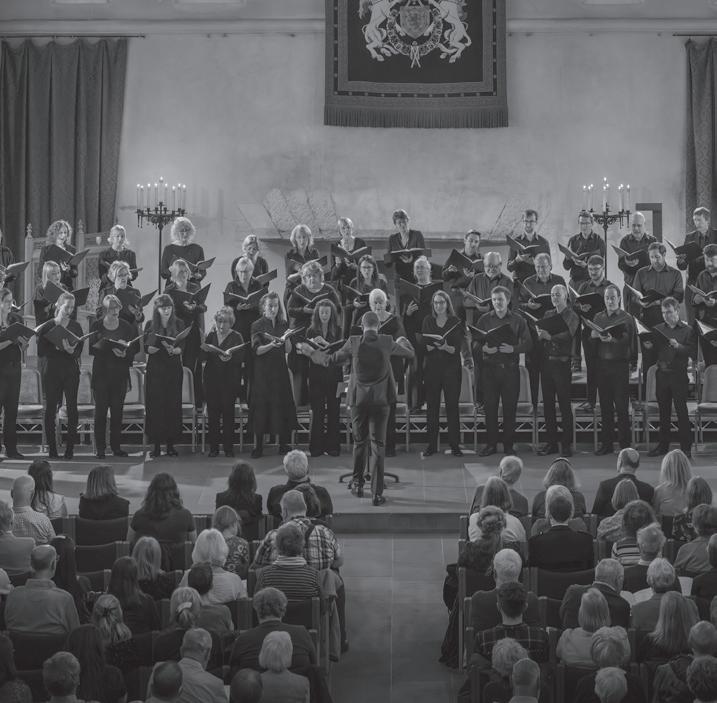
The Scottish Chamber Orchestra Chorus, under the direction of Gregory Batsleer since 2009, has built a reputation as one of Scotland’s most vibrant and versatile choirs. Widely regarded as one of the finest orchestral choruses in the UK, it celebrated its 30th anniversary in 2021. Members enjoy the unique opportunity of performing with one of the world’s leading chamber orchestras, working with international conductors including Maxim Emelyanychev, Andrew Manze, Harry Christophers, Richard Egarr, Václav Luks and Sir James MacMillan.
The Chorus appears regularly with the Orchestra in Scotland’s major cities. Recent concerts have covered a wide range of music including Bach’s Mass in B minor, Brahms’ Requiem, Haydn’s Creation and a rare performance of Vaughan Williams’ Flos Campi. A performance of Sir James MacMillan’s Seven Last Words from the Cross was a highlight of the 2024-25 Season. SCOC has given the premiere performances of several SCO Commissions for choir and orchestra including The Years by Anna Clyne (SCO Associate Composer 2019-2022) and James MacMillan’s Composed in August; the coming season will see the premiere of The Language of Eden by SCO Associate Composer Jay Capperauld.
The SCO Chorus also performs a capella, both digital and live, in music ranging from Tallis and Purcell to new work by Anna Clyne and Jay Capperauld. Its annual Christmas concerts at Edinburgh’s Greyfriars Kirk have established themselves as a Season highlight; the Chorus also enjoys appearing on the SCO’s Summer Tour. Other notable out-of-Season appearances have included criticallyacclaimed performances with the SCO at the BBC Proms in Handel’s Jephtha in 2019 and in Mendelssohn's Elijah in 2023. The Chorus appeared with Maxim Emelyanychev and SCO in a semi-staged performance of Mozart’s Die Zauberflöte at the 2023 Edinburgh International Festival, resulting in re-invitations for Così fan tutte in 2024 and La Clemenza di Tito in 2025.
SCOC’s Young Singers' Programme was established in 2015 to nurture and develop aspiring young singers. It is designed for young people with a high level of choral experience and ambitions to further their singing with a world-class ensemble.
Further information at sco.org.uk
The SCO Chorus Young Singers' Programme is kindly supported by the Baird Educational Trust.
© Christopher Bowen
Your Chorus Tonight
Information correct at the time of going to print
SOPRANO
Emma Aitken
Kirstin Anderson
Morven Chisholm
Mairi Day
Liberty Emeny
Emily Gifford
Alice Higgins
Nicola Henderson
TENOR
Matthew Andrews
Magnus Bushby*
Ben Evans*
Colin French
Theodore Hill
Fraser Macdonald
Keith Main
Matt Norriss
Gregory Batsleer
Chorus Director
Stuart Hope
Associate Chorusmaster
Emma Morwood
Voice Coach
Susan White
Chorus Manager
* Young Singers' Programme
Florence Kaiser*
Emily Kemp*
Katie McGlew
Anna Morris*
Jenny Nex
Annike Petin
Alison Williams
ALTO
Shona Banks
Dinah Bourne
Sarah Campbell
Gill Cloke
Judith Colman
Anne Gallacher
Jennie Gardner
Claire Goodenough
Anne Grindley
Caroline Hahn
Fiona Haldane
Lorna Htet-Khin
Rachel Kemp
Charlotte Perkins
Linda Ruxton
Olivia Smith*
Michael Scanlon
Paul Vaughan
BASS
Mathew Brown
Gavin Easton
Orlando Griffiths*
Robin Hiley
Hugh Hillyard-Parker
Richard Hyder
Taliesin Liston-Smith*
Donald MacLeod
Richard Murphy
Kenneth Murray
Douglas Nicholson
Jason Orringe
David Paterson
Fraser Riddell
Stephen Todd
Roderick Wylie
Scottish Chamber Orchestra

The Scottish Chamber Orchestra (SCO) is one of Scotland’s five National Performing Companies and has been a galvanizing force in Scotland’s music scene since its inception in 1974. The SCO believes that access to world-class music is not a luxury but something that everyone should have the opportunity to participate in, helping individuals and communities everywhere to thrive. Funded by the Scottish Government, City of Edinburgh Council and a community of philanthropic supporters, the SCO has an international reputation for exceptional, idiomatic performances: from mainstream classical music to newly commissioned works, each year its wide-ranging programme of work is presented across the length and breadth of Scotland, overseas and increasingly online.
Equally at home on and off the concert stage, each one of the SCO’s highly talented and creative musicians and staff is passionate about transforming and enhancing lives through the power of music. The SCO’s Creative Learning programme engages people of all ages and backgrounds with a diverse range of projects, concerts, participatory workshops and resources. The SCO’s current five-year Residency in Edinburgh’s Craigmillar builds on the area’s extraordinary history of Community Arts, connecting the local community with a national cultural resource.
An exciting new chapter for the SCO began in September 2019 with the arrival of dynamic young conductor Maxim Emelyanychev as the Orchestra’s Principal Conductor. His tenure has recently been extended until 2028. The SCO and Emelyanychev released their first album together (Linn Records) in 2019 to widespread critical acclaim. Their second recording together, of Mendelssohn symphonies, was released in 2023, with Schubert Symphonies Nos 5 and 8 following in 2024.
The SCO also has long-standing associations with many eminent guest conductors and directors including Principal Guest Conductor Andrew Manze, Pekka Kuusisto, François Leleux, Nicola Benedetti, Isabelle van Keulen, Anthony Marwood, Richard Egarr, Mark Wigglesworth, Lorenza Borrani and Conductor Emeritus Joseph Swensen.
The Orchestra’s current Associate Composer is Jay Capperauld. The SCO enjoys close relationships with numerous leading composers and has commissioned around 200 new works, including pieces by Sir James MacMillan, Anna Clyne, Sally Beamish, Martin Suckling, Einojuhani Rautavaara, Karin Rehnqvist, Mark-Anthony Turnage, Nico Muhly and the late Peter Maxwell Davies.
© Christopher Bowen
17-19 December, 2pm
St Andrews | Edinburgh | Glasgow
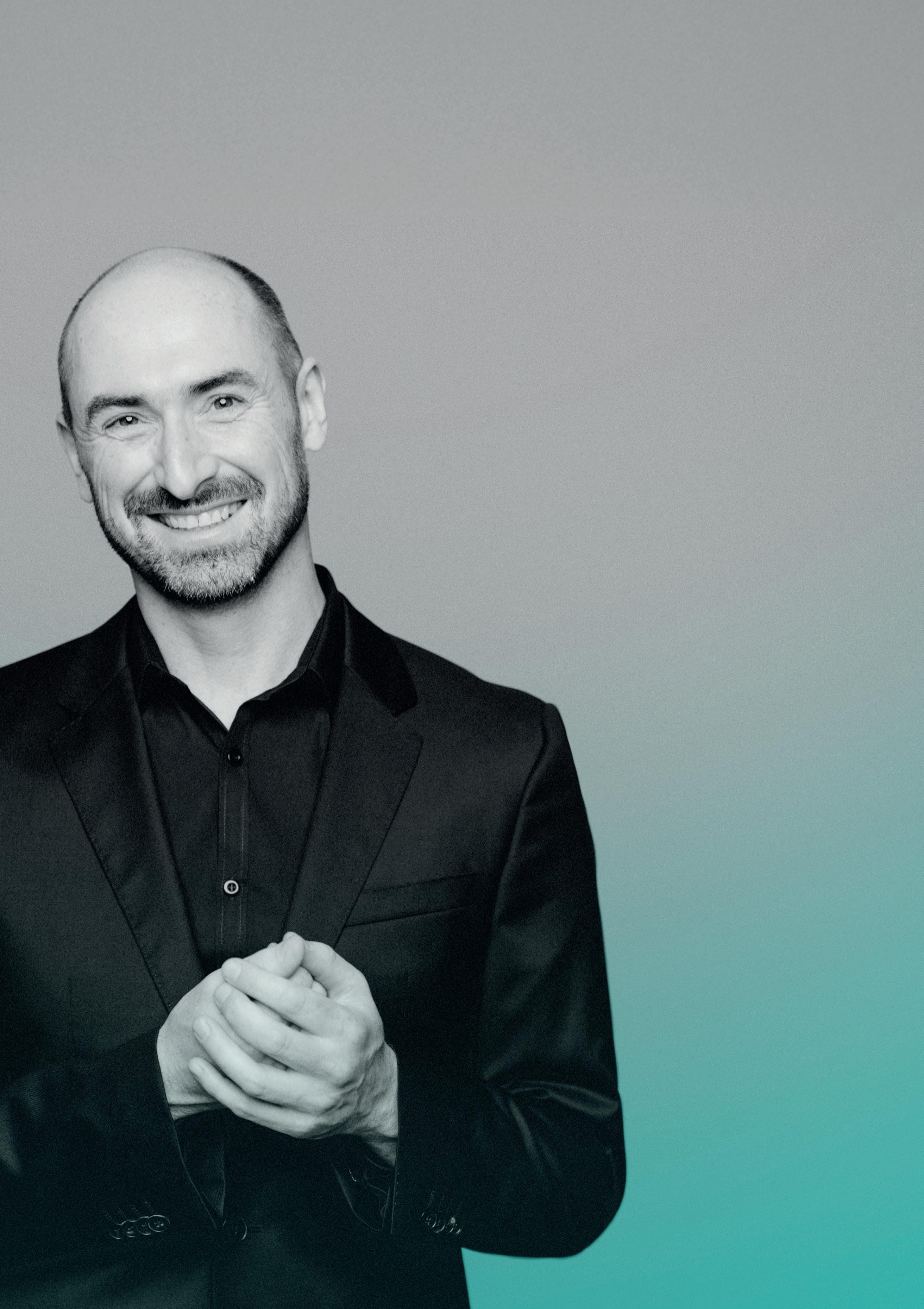
LEARN MORE
Mozart Matinee
with Peter Whelan
Peter Whelan conductor/fortepiano
Tara Erraught mezzo soprano
Maximiliano Martín clarinet
Peter Franks posthorn
Under 26s for £6
Under 18s go free
For the love of music
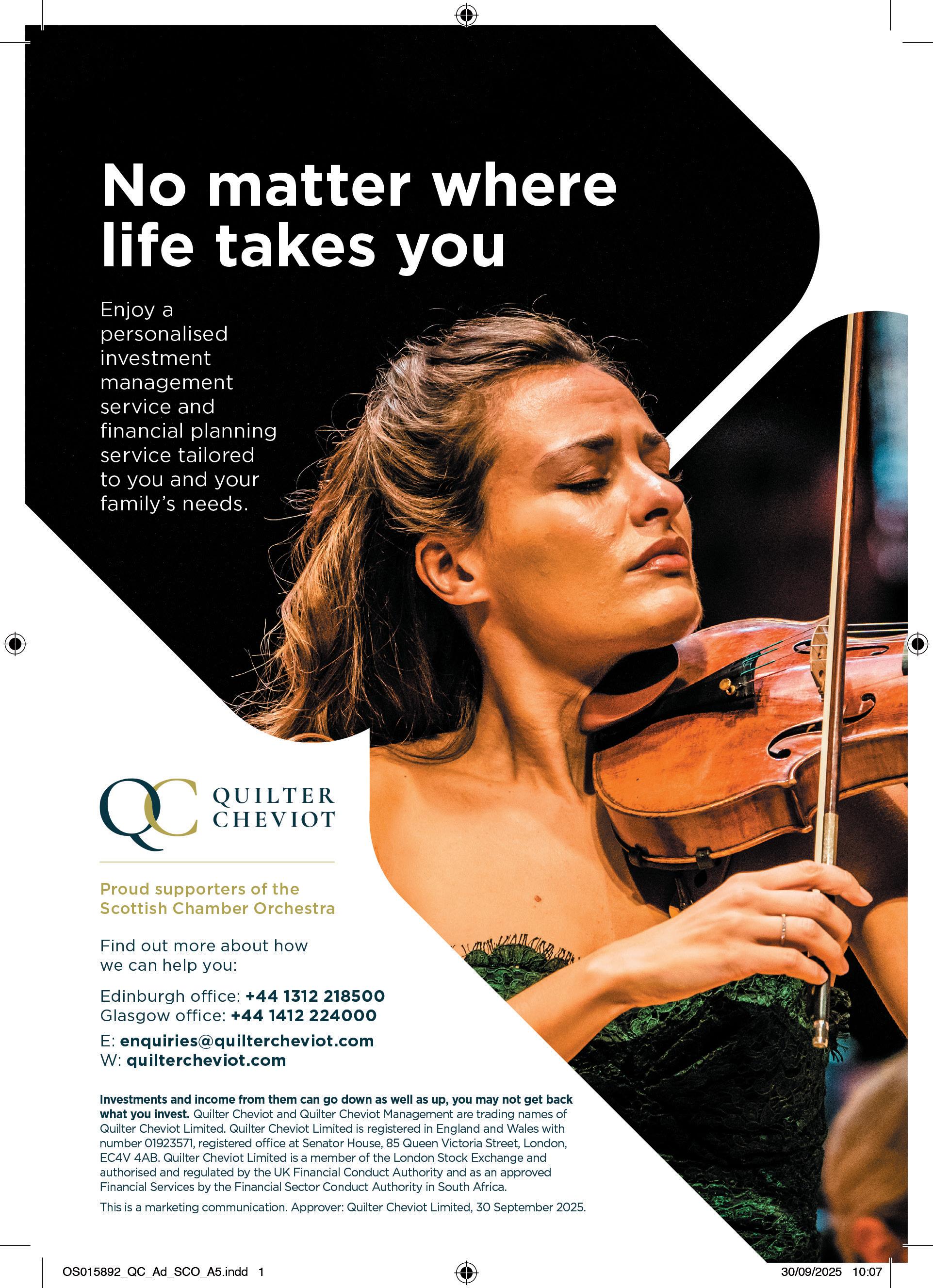
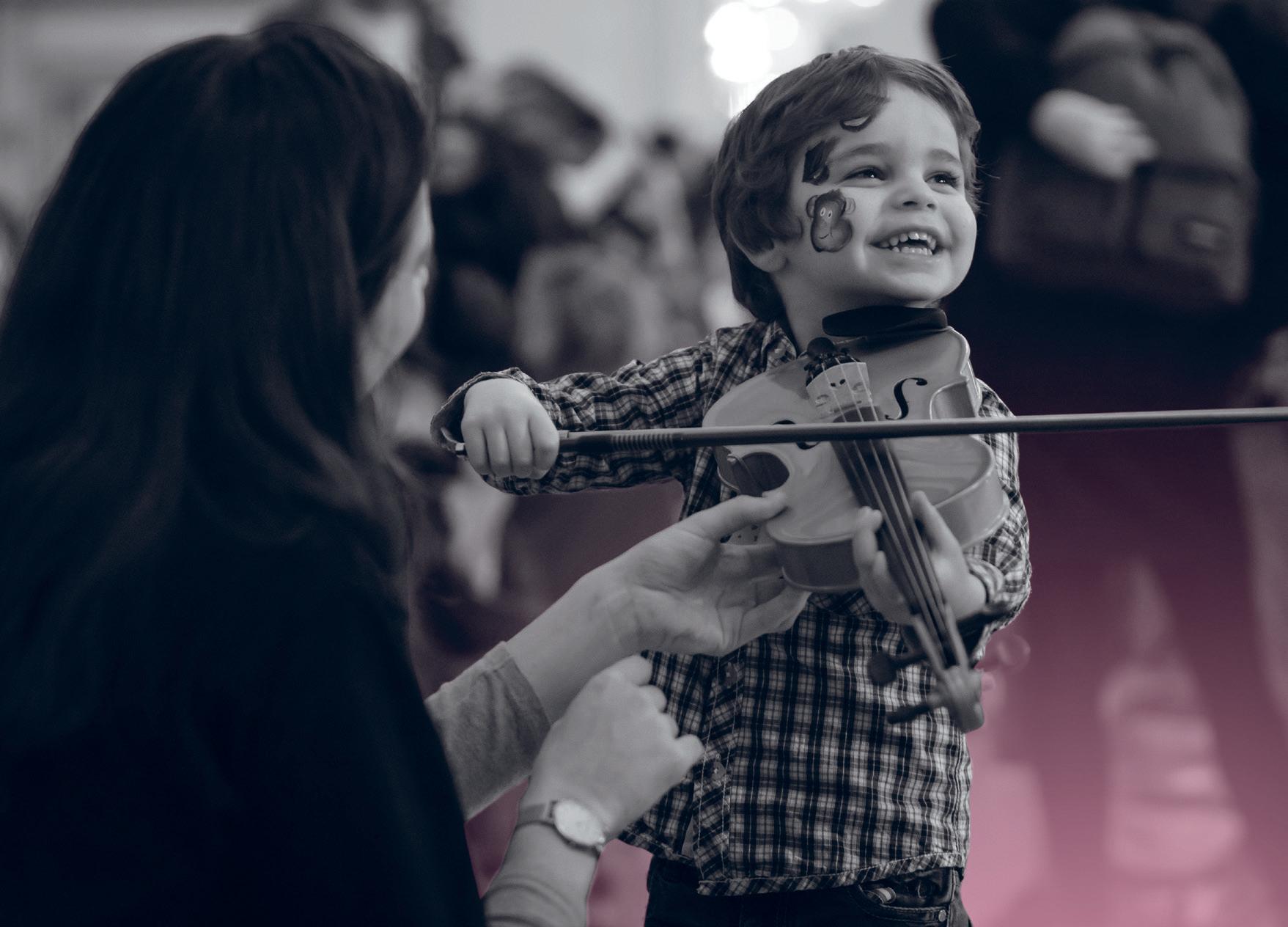

Support Us
Each year, the SCO must fundraise around £1.2 million to bring extraordinary musical performances to the stage and support groundbreaking education and community initiatives beyond it.
If you share our passion for transforming lives through the power of music and want to be part of our ongoing success, we invite you to join our community of regular donors. Your support, no matter the size, has a profound impact on our work – and as a donor, you’ll enjoy an even closer connection to the Orchestra.
To learn more and support the SCO from as little as £5 per month, please contact Hannah at hannah.wilkinson@sco.org.uk or call 0131 478 8364.
SCO is a charity registered in Scotland No SC015039.
Photo: Stuart Armitt
The
